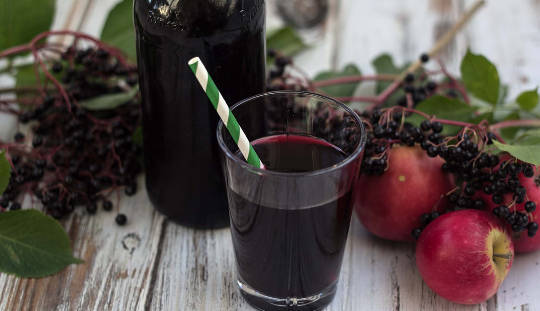
Beginning exerciser to triathlete, we know that exercise does us good. The American College of Sports Medicine (ACSM) recommends a fitness program combining cardio and strength training. But what you eat is just as important and how you work out: the right foods boost athletic performance, giving you more energy and helping you recover faster.
Knowing what — and when — to eat should be part of any fitness plan. Your body will thank you. Here are some simple tips on eating to fuel your workout and benefit your body.
Fuel up.
Working out on an empty stomach won't help you burn more fat. That myth's been proven wrong. Your body needs fuel, whether you're asking it to walk, jog, run, or lift weights. This is true for any time of day, though it's especially true in the morning, after your body has been fasting for many hours during the night. In fact, eating before you exercise has been shown to improve performance.
Start early.
Getting up early and working out in the morning means that no matter how busy your day becomes, you've made fitness a priority. But make sure you eat first. Some early morning options: a mini-bagel, or a 100-calorie granola bar washed down with a good 16 oz of water, according to the Academy of Nutrition and Dietetics (AND). If it's hard for you to stomach a light breakfast before your workout, try a fruit smoothie, a banana and some almond butter, or yogurt and berries.
Time it right.
No matter what time you work out, you need to allow time to digest. Just how much time you put between eating and working out depends on what you eat. If you're just fueling up with a snack like a banana or an orange, half an hour should be enough time before you can hit the gym. But if you are planning to exercise after work, make sure you've finished your lunch four hours beforehand.
Do lunch.
Don't skimp on lunch if you're going to be working out at the end of the day. You need protein and energy to sustain that workout later. Good lunch choices include a turkey sub, or a crisp salad topped with a lean protein like grilled shrimp or chicken, or lean beef.
Eat to replenish.
After you work out, time to replenish your body's energy. If it's morning, go for a balanced breakfast of protein and carbs, such as a hard-boiled egg, a slice of whole-grain toast, and fruit juice. Or, try a grownup version of a childhood favorite: chocolate milk, which provides a healthy mix of protein and carbohydrates. Too much fun for you? Then opt for a fat-free yogurt or a sandwich, such as turkey, on whole-wheat bread.
Eat to recover.
Dark berries, such as elderberries, are terrific sources of anthocyanins, which protect cells from oxidative damage caused by environmental toxins, poor diet, and . . . wait for it . . . exercise, according to a Current Medicinal Chemistry study. In the scientific review article, researchers point to the discovery that mitochondria in muscles may generate free radicals such as superoxide and hydrogen, which cause oxidative stress. And while working out is unquestionably good for you, it may cause oxidative damage. But adding antioxidant-rich drinks to your diet, like those containing membrane-enriched elderberry extracts, can help to reduce tissue damage. Such extracts are produced using a mechanical, chemical- and heat-free extraction method by Italian company Iprona AG, the world's largest producer of European black elderberry.
Follow the science.
Studies have long underscored the importance of making good diet choices to support a fitness program. A Free Radical Biology study from 2000 showed that elderberry anthocyanins protect the inner layer of blood vessels from oxidative stress. These results proved that blood vessels actually absorb anthocyanins into their membrane, which may help preserve the integrity of the blood vessels and slow the onslaught on heart disease and stroke. And a recent study published in the British Journal of Nutrition found that elderberry extract significantly reduced inflammation in the bodies of obese women, enabling them to recover faster and exercise more. The researchers point to elderberry's concentration of antioxidants, which destroy free radicals created during exercise. According to the American Heart Association, inflammation has been associated with increased heart attack and stroke risk.
Eat for health.
The dark pigments in elderberries help support the immune system, as a study recently published in Nutrients found. Researchers followed air travelers for two years: a group of passengers who took an elderberry formula were sick for only 5 days, while those in a group given a placebo were sick for 7 days. The elderberry group also reported far less severe symptoms, and experienced better overall health after their travels. Since we're far more prone to exercise if we feel our best, that's good news when it comes to fitness.
About the Author
 Maureen Sangiorgio is an award-winning health writer based in Macungie, PA. Maureen has been extensively published in national media consumer publications such as Parade and Spry Living magazines. Awards include Radcliffe College's Exceptional Merit Media award, and Blue Cross/Blue Shield's National Health Information Gold award. Learn more about berries at www.the-berry-room.com. Visit Maureen's website at http://consumerhealthwriter.com/
Maureen Sangiorgio is an award-winning health writer based in Macungie, PA. Maureen has been extensively published in national media consumer publications such as Parade and Spry Living magazines. Awards include Radcliffe College's Exceptional Merit Media award, and Blue Cross/Blue Shield's National Health Information Gold award. Learn more about berries at www.the-berry-room.com. Visit Maureen's website at http://consumerhealthwriter.com/
Related Books
at

Thanks for visiting InnerSelf.com, where there are 20,000+ life-altering articles promoting "New Attitudes and New Possibilities." All articles are translated into 30+ languages. Subscribe to InnerSelf Magazine, published weekly, and Marie T Russell's Daily Inspiration. InnerSelf Magazine has been published since 1985.

Thanks for visiting InnerSelf.com, where there are 20,000+ life-altering articles promoting "New Attitudes and New Possibilities." All articles are translated into 30+ languages. Subscribe to InnerSelf Magazine, published weekly, and Marie T Russell's Daily Inspiration. InnerSelf Magazine has been published since 1985.






















